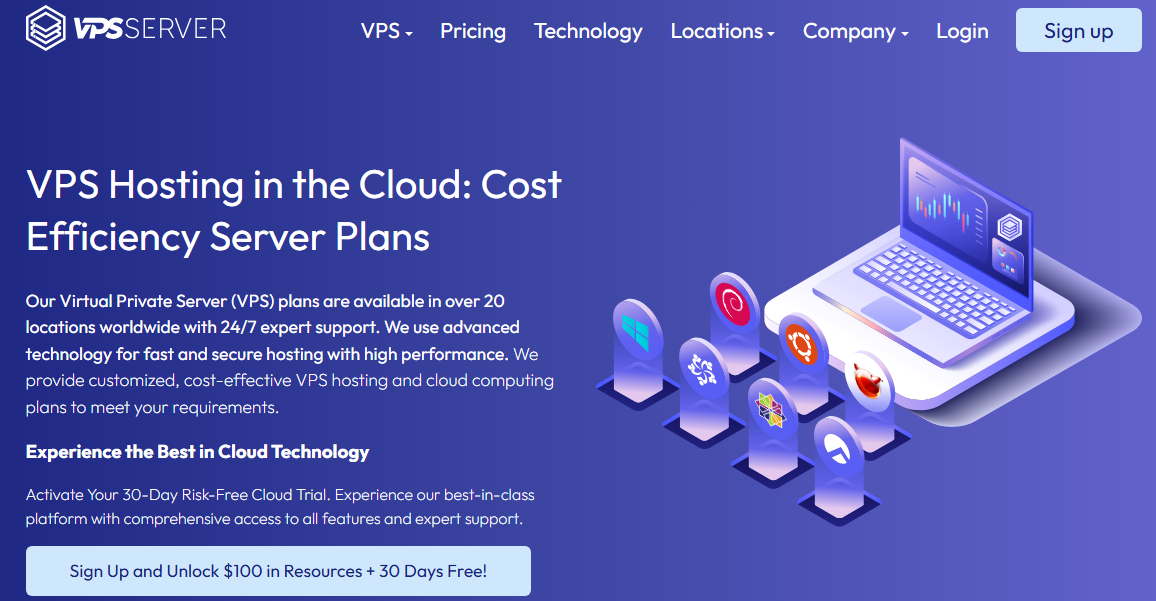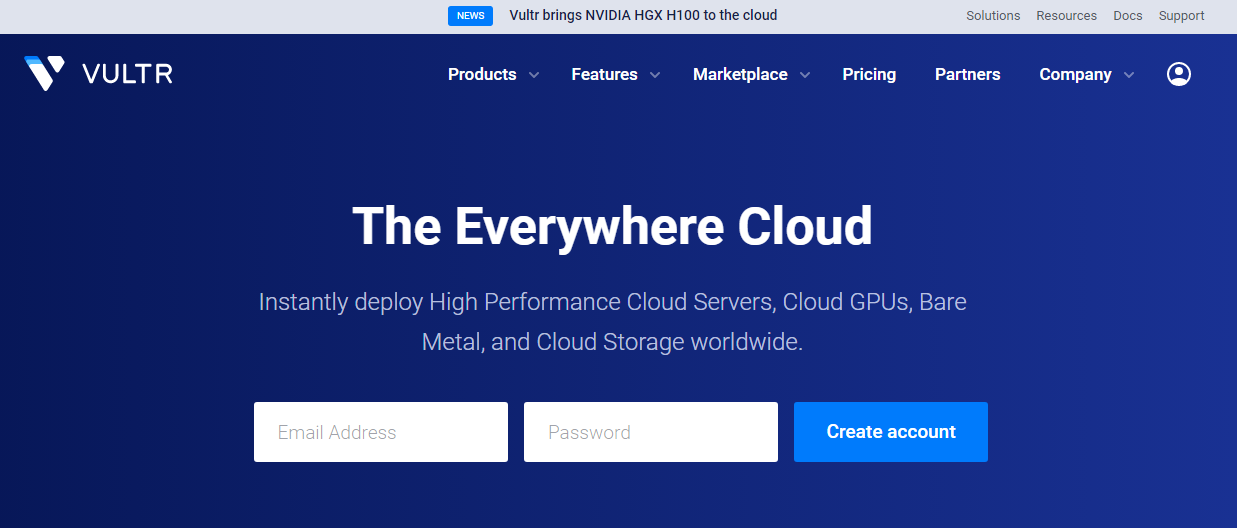Looking for a free VPS to host your own VPN is a smart move. It helps you save time, money, and gives you the freedom to test different providers without spending a dime. Once you find the right fit, you can seamlessly upgrade to their premium plans for full performance.
Our team tested dozens of VPS providers and shortlisted the top 5 free VPS services based on performance, latency, security, and reliability.
Together, these platforms offer over $500 in free credits, making them perfect for VPN deployment—whether you’re looking for speed, security, or global access.
Let’s dive in.
⏰ In Hurry? Check Out the Best Free VPS Trial Offers →

- Free 30-Day Trial With $100
- Enterprise-Grade Infrastructure
- One Click VPN Apps
- 24 Global Data Centers
- 1-Click Scalability
- Firewall & Disaster Recovery Management
- 24/7 Live Chat Support

- Free 30-Day Trial with $100
- Business-Grade Infrastructure
- One Click VPN Apps
- NVMe SSD
- 24 Data Centers
- 24/7 Phone Support
Do you want to run a VPN without paying upfront? These 5 free VPS trials are perfect for VPN setups — offering over $500 in free credits, no credit card needed on some, and top-tier infrastructure. Whether you want blazing speed, 1-click VPN app deployment, or global data centers — Kamatera, VPSServer, Vultr, DigitalOcean, and Linode have you covered.
- Kamatera: $100 credit + 30 days, 24 DCs, enterprise-grade, needs card
- VPSServer: $100 credit + 30 days, NVMe SSD, low latency, needs card
- Vultr: $100 credit + 30 days, 5+ VPN apps, no card required
- DigitalOcean: 7+ VPN apps, fast & simple UI, no card required
- Linode (Akamai): $200 credit + 30 days, no card required, best for advanced tasks too
Whether you’re bypassing geo-blocks, securing your connection, or just experimenting — these trials help you test before you commit. Just spin one up, deploy a VPN app in a click, and take control of your privacy.
Table of Contents
1. Kamatera
Kamatera is a top-tier cloud provider with enterprise-grade infrastructure and a strong “try before you buy” policy. They offer a 30-day free trial along with $100 in free credits.
You can deploy popular VPN apps like OpenVPN or UTunnel in just one click.
Performance is impressive: their entry-level VPS responded in just 22 ms (TTFB) and achieved 100% uptime during stress testing.
You can try the robust resource out with a credit card. They only charge $1-2 to validate the genuineness of the customer and revert it back in the same time.
- Enterprise-Grade Infrastructure
- Powerful 2.7 GHz Intel Xeon Platinum Processor
- DDR5 RAM & NVMe SSD
- 24 Global Data Centers
- Clean & Intuitive Dashboard
- 2 One-Click VPN Apps
- Daily Backups
- DDoS Protection
- 24/7 Expert Live Chat, Ticket & Call Support
- Flexible “pay-as-you-go” pricing
- Managed Service at a high cost
2. VPSServer
Built with business-grade infrastructure, VPSServer offers a 30-day free trial and $100 free credit. Their servers guarantee <50 ms TTFB, ensuring low latency for VPN usage.
They support 1-click installations of OpenVPN and UTunnel VPN.
VPSServer boasts 10 Gbps port speeds, NVMe storage, and 24/7 support via phone or email. Their global infrastructure spans 24 data centers, giving you more regional flexibility.
Pros
- Business-Grade Infrastructure
- Fast 2.7 Ghz Intel Xeon Skylake Processor
- Professionally Managed Service
- 24 Global Data Centers
- 2 One-Click VPN Apps
- Diagonal Scaling
- NVMe Storage
- 24/7 Quick Phone and Email Support
- Modest Monthly Billing
- No SSH Key Support
3. Vultr
Vultr is known for its high-frequency compute instances powered by 3GHz Intel Skylake CPUs and NVMe local storage. They offer a 30-day free trial with multiple 1-click VPN apps like:
- WireGuard
- UTunnel
- Pritunl
- WarpSpeed
- CloudHub
Even better, no credit card is required to start.
In our test, the entry-level VPS responded in 54ms, handled 2,000 concurrent users, and maintained 100% uptime.
- High-performance infrastructure
- Choice of Intel & AMD CPUs
- NVMe SSD Storage
- 5 One-click Apps
- 32 Data centers
- Cloud Firewall
- Support is ticket-only
4. Digital Ocean
DigitalOcean offers a clean, beginner-friendly interface and powerful servers. Their 30-day free trial includes multiple VPN apps like:
- UTunnel
- Pi-hole
- NetMaker
- WarpSpeed
- UH VPN
- Pritunl
Performance is solid with <200ms response time and 99.96% uptime in tests. Premium droplets feature NVMe SSDs and 3.2 GHz AMD CPUs, delivering twice the performance.
- Beginner-friendly interface
- 15 Data Center
- NVMe SSD Storage
- Intel & AMD Chip
- 7+ One-click Apps
- Poor support
5. Linode
Linode (now part of Akamai) is one of the most trusted cloud platforms on G2. It offers a 30-day free trial with a $200 credit—no credit card required.
It supports leading VPN apps like WireGuard, OpenVPN, UTunnel, WarpSpeed, and Pritunl.
Linode’s infrastructure is perfect for everything from simple VPNs to AI processing and video rendering—thanks to AMD EPYC CPUs and NVIDIA RTX GPUs on select plans.
- 15 Data Centers
- Transparent Monthly Pricing
- 99.99% Uptime SLA
- Free DDoS Protection
- 5+ One-click VPN Apps
- Poor Support
| VPS | Type | Duration | CC Required | Link |
|---|---|---|---|---|
| Kamatera | Cloud | 30 Days | Yes | |
| VPSServer | Cloud | 30 Days | Yes | |
| Vultr | Cloud | 30 Days | No | |
| DigitalOcean | Cloud | 30 Days | No | |
| Linode | Cloud | 30 Days | No |
Final Thoughts
Using a free VPS for VPN is a powerful way to take control of your privacy, bypass restrictions, and explore advanced networking—without spending a dime upfront.
Each provider listed above offers generous credits, easy VPN deployment, and reliable infrastructure. Whether you want blazing speed, enterprise hardware, or zero-cost trials with no credit card—there’s something here for you.
Still unsure? Try a few and compare the experience. That’s the beauty of free VPS trials—they let you test, tweak, and trust before committing.
FAQ
1. Can I really host my own VPN on a free VPS without paying anything?
Yes, you can. Many top cloud providers offer generous free trials that include credits, one click VPN apps, and fully functional VPS machines. These free trials allow you to deploy WireGuard, OpenVPN, UTunnel, and other VPN apps without paying upfront. Some providers also do not require a credit card, making it easier to test everything risk free.
2. Which free VPS provider is best for running a fast and secure VPN?
Kamatera is the strongest choice if you want enterprise grade performance. It offers $100 credit and 30 days of free usage, with 2.7 GHz Intel Xeon Platinum CPUs, NVMe SSDs, and 24 global data centers. For card free sign up, Vultr and Linode are amazing options. Both provide one click VPN installations and stable, low latency networks.
3. Do I need technical knowledge to deploy a VPN on these free VPS trials?
Not at all. All the listed cloud providers offer one click VPN applications like OpenVPN, Pritunl, WireGuard, UTunnel, and more. You simply choose the app, select your region, and launch the server. The system auto installs everything. Even beginners can deploy a VPN in under two minutes.
4. Will my VPN be secure if I use a free VPS trial?
Yes. These platforms offer the same security on free trials that they offer on paid plans. You get enterprise level firewalls, DDoS protection, encrypted storage, and secure networking. The VPN itself encrypts your traffic, so your data remains private whether you use Kamatera, Vultr, DigitalOcean, or Linode.
5. What happens after the free trial ends?
Your VPN will stop working unless you upgrade to a paid plan. However, you can delete the server before the trial ends to avoid charges. Most providers offer pay as you go pricing, so you only pay for the resources you use. You can also switch to another free trial provider and continue using a free VPS for your VPN.
Ravi Kumar is a Server Performance Analyst with over 4 years of experience benchmarking cloud infrastructure. He has optimized and stress-tested over 150+ websites, digging deep into uptime, disk latency, and CPU performance. Whether you’re looking for a free trial or a high-performance production server, Ravi uses real-world data to help you find the perfect host.

Just wanted to drop in and say thanks for this awesome list! 😊 I’m a freelancer always on the lookout for good hosting services for my projects and I hardly ever come across lists that mention free trials. Super helpful because testing them out without spending a penny first is a huge plus. Gonna give Linode a go because I’ve heard they’re great for cloud services. Has anyone tried Linode for hosting websites? Curious to know your thoughts before I dive in!
i’ve tried most of these vps providers mentioned and honestly, they all seem the same after a while. vultr’s been okay for personal projects but idk, none of them really stand out. digital ocean was hyped up so much but their support was a letdown. anyone else feel this?
interesting take, trevor! i’ve used digital ocean for my blog and had a pretty good experience. maybe it depends on what you’re using it for? love experimenting with new tools though!
The comment regarding support quality is valid. However, it’s crucial to assess VPS providers based on specific requirements such as uptime, scalability, and developer tools. Each platform has its stand-out features. For those seeking detailed comparisons, it may be useful to consult direct customer testimonials and benchmark tests for a more nuanced overview.
Hey Ravi Kumar, great rundown of VPS options! I’ve been on the fence about switching from Digital Ocean to Kamatera. How does Kamatera’s performance and pricing compare directly? I’m all for trying new services, especially if there’s a free trial, but I need something reliable for my small business.